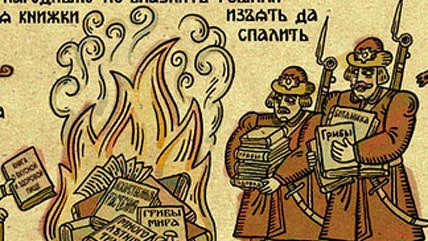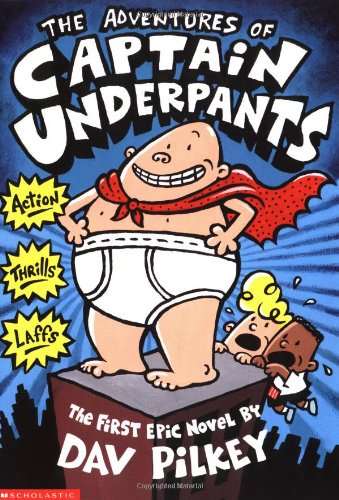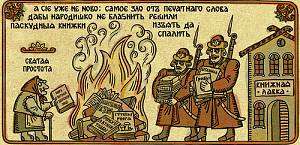Banned Books: Guess Which Book Topped the List Again


The American Library Association is "celebrating" (their words, not mine) Banned Books Week. For the second year in a row, the most frequently challenged piece of literature in the Land of the Free is Captain Underpants.
Why are so many crusaders trying to remove this work from schools and libraries? The three main reasons cited by those who challenge Captain Underpants are its "offensive language," "violence," and "unsuitable" content for its prepubescent target demographic.
However, author Dav Pilkey points out that his "books contain no sex, no profanity, no nudity, no drugs, and no graphic violence (at least nothing you wouldn't see in a 1950's Superman comic book). So what's the big deal?" Pilkey puts in nicer words, but basically, there's a whole bunch of nanny-types out there who never bother cracking his books open for themselves before deciding that an eight-year-old giggling while reading is reason enough to go into literary lockdown.
Much of the top 10 list contains such lightweight reading – Fifty Shades of Grey, The Hunger Games, Bone – that, as Reason's Katherine Mangu-Ward has previously suggested, it's such a banal evil, it's hard to be angry at. If America's politically-and-morally-correct Frankenstein monsters have only enough synapses firing to challenge comic books and pop porno, they're presumably (hopefully) a coalition no longer literate enough to take issue with Brave New World (previously challenged for "insensitivity") or To Kill a Mockingbird (previously challenged for "racism").

This isn't to make light of censorship. The Kid's Right to Read Project, an arm of the National Coalition Against Censorship, says that pro-censorship book challenges rose a dramatic 53 percent in 2013. That organization believes that "each time a book is a removed it reinforces the idea that books and ideas are off-limits if someone doesn't like them. It contributes to a culture where it's better to hide from controversial or difficult topics, than to acknowledge or discuss them."
Nor am I jabbing at the merits of Captain Underpants. As Banned Books Week Chair Judith Platt realizes, the book is "naughty and it's seditious and it certainly is irreverent and challenges authority."
Pilkey agrees. He believes "it is important… to question authority — because, you know, there are villains in real life, and they don't always wear black capes and black hats. Sometimes they're dressed like authority figures. And kids need to know that it's important to question them."
Check out the rest of the challenged books list here.
Editor's Note: As of February 29, 2024, commenting privileges on reason.com posts are limited to Reason Plus subscribers. Past commenters are grandfathered in for a temporary period. Subscribe here to preserve your ability to comment. Your Reason Plus subscription also gives you an ad-free version of reason.com, along with full access to the digital edition and archives of Reason magazine. We request that comments be civil and on-topic. We do not moderate or assume any responsibility for comments, which are owned by the readers who post them. Comments do not represent the views of reason.com or Reason Foundation. We reserve the right to delete any comment and ban commenters for any reason at any time. Comments may only be edited within 5 minutes of posting. Report abuses.
Please to post comments


If America's politically-and-morally-correct Frankenstein monsters have only enough synapses firing to challenge comic books and pop porno, they're presumably (hopefully) a coalition no longer literate enough to take issue with Brave New World (previously challenged for "insensitivity") or To Kill a Mockingbird (previously challenged for "racism").
I'm glad this was brought up. I'm sitting there, reading that some book called "Captain Underpants" is topping the objectionable books list, and I was scratching my head wondering, "What happened to all the Mark Twain and dead mockingbirds?"
I can't wait to see what's going to top the list fifteen years from now.
Simple, the children who were banned from reading Huxley or Twain grew into the folks who are banning Captain Underpants. They no longer fathom the former exists.
Meh. This is martyrdom porn.
Are 'R' rated movies "banned movies"?
It contributes to a culture where it's better to hide from controversial or difficult topics, than to acknowledge or discuss them.
And why are some topics controversial or difficult? Because they are *offensive* or *bad*. Discussing such things is a fool's errand at best and a precipitation of disaster at worst.
/sarc
Ah yes, the usual "Banned Books" kabuki. Because if the book isn't in your school library or taught as a textbook, it's effectively being withheld from our children.
If I wrote children's books, and they decided not to make my work available in school libraries, I'd rejoice that the kids had an incentive to *buy* my work rather than read it for free. And if my book were removed from the curriculum, I would thank the Lord that kids weren't associating my writings with boring school crap.
There was this troll over on the Kindle Direct Publishing forum who insisted that because His work wasn't selling that nobody reads anything anymore and nobody buys books.
It's the same train of thought at work. If the book is where I can't see it, the kids won't get at it.
More than that - it's "*we*, the credential professionals who work in the school system, get to pick books for the curriculum and the school library. Outside intermeddlers, that is, parents, shouldn't but their noses into our business."
I'd be more impressed if they protested the banning of *Mein Kampf,* the *Turner Diaries,* etc.
Yup.
That and the conflation of "challenges" that are unsuccessful because the library boards ignore them with "banned books".
Anything to make it sounds like Some Serious Problem rather than a tempest in a teapot.
It doesn't make a god-damn bit of difference if a book is in a school library anyway - kids have the internet, and for those that don't, in almost all cases there's a non-school library, too.
I care about censorship when the State tries to tell me I can't get a book with my money, or own it, or read it, or tries to make a book or idea stop existing.
Which ... is not happening here in the US, or if it is, it's a damned well-kept secret.
(But not if the State tells me it won't put that book in a K-12 library, if enough people complain about how their tax money is being used and how their kids who are forced to be there are exposed to it.
First they coerce them into paying. Then the kids into attending. Then into having no say over the content they're paying for?
Screw that; the only free libraries are independent ones. All state-owned ones aren't going to be, in the long run, no matter what Librarian Associations tell themselves with their Brave Front Line Defender Of Freedom posturing.
[... Plainly I haven't had enough outlets for how annoying BWB is for the past few years?])
This is exactly what I was thinking. BFD.
Parents alone have the right to control their minor children's reading habits.
My kids loved the Captain when the were in early grade school. Irreverent and funny.
Captain Underpants is wonderful, even as an adult. It definitely pokes fun at the stupidity of authority, but ultimately it upholds being kind and decent human beings. Sure, there is a lot of poop, snot, and fart jokes, but I think the only reason one of my sons turned into a prolific reader is because he was exposed to Captain Underpants and it made him want to read. I can only imagine those who would ban it to be Prudy McPrudes who can't stomach the thought that people have body functions.